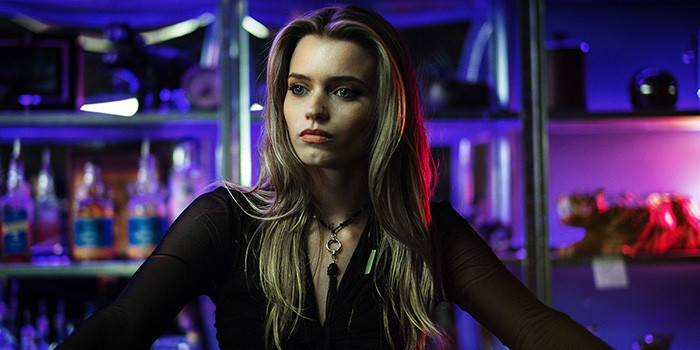Stephen McCallum’s Outlaws immediately sparks a comparison. Before even settling in to watch, the shadow of Sons of Anarchy looms large. One wants to judge Outlaws on its own merits, separate from Kurt Sutter’s iconic biker saga. Yet, from the outset of Matt Nable’s script, the echoes are undeniable. The film centers on the Copperheads Motorcycle Club, led by the ambitious Paddo (Ryan Corr), who aims for legitimacy. This ambition clashes head-on with the club’s president, Knuck (played by Nable himself), newly released from prison and hungry for violence. This core conflict – a power struggle between tradition and change within a biker gang – feels strikingly familiar.
While Sons of Anarchy benefited from the expansive canvas of television to build character depth and narrative complexity, Outlaws, constrained by a ninety-minute runtime, struggles to achieve the same. The supposed father-son dynamic between Knuck and Paddo, hinted at through a single, almost dismissible line, feels underdeveloped. This revelation arrives too late, after their ideological rift has widened beyond repair, making their past camaraderie unbelievable. Three years of separation in the brutal world of a biker club seem to have created an irreparable chasm. Knuck returns hardened and suspicious, viewing Paddo’s progressive approach as a threat, while Paddo sees Knuck’s brutality as outdated and detrimental to the club’s future.
The film introduces female characters, ostensibly catalysts for the growing divide between Knuck and Paddo, but here Outlaws arguably stumbles even more when contrasted with Sons of Anarchy. Knuck’s wife, Hayley (Simone Kessell), lacks the conflicted maternal nuance of Gemma Teller Morrow. Paddo’s girlfriend, Katrina (Abbey Lee), isn’t striving for a life outside of crime like Tara Knowles. Instead, these women are portrayed as manipulative figures, seemingly devoid of empathy, seeking control above all else. Hayley poisons Knuck’s perception of Paddo, while Katrina pushes Paddo towards a violent takeover.
These women are undeniably intelligent in their machinations, positioned as puppet masters pulling strings from the shadows. The film attempts to solidify this perception, particularly towards the conclusion, yet struggles to make it convincing. The issue lies in the film’s reliance on tired, sexist biker stereotypes, preventing these characters from developing beyond clichés. Adding to the narrative shortcomings is Paddo’s simple-minded brother, Skink (Josh McConville), who serves as a plot device to escalate the conflict between the old and new guard. Skink acts impulsively on the women’s suggestions, while other characters grapple with sudden moral qualms.
 Ryan Corr and Matt Nable in a tense confrontation in the film biker movie Outlaws
Ryan Corr and Matt Nable in a tense confrontation in the film biker movie Outlaws
The film doesn’t subvert machismo; it reinforces it. Paddo and Knuck appear to hesitate before truly betraying each other, seemingly unwilling to sacrifice their brotherhood for the women in their lives. This is where Skink, the archetypal fool, becomes the scapegoat, inadvertently setting in motion the very conflict Katrina and Hayley desired. A character seemingly existing solely to create chaos becomes central to the plot. This portrayal, along with Noisy (Sam Parsonson), who features in another questionable scene, equates sensitivity with naiveté.
Beyond the pervasive misogyny that reduces Katrina and Hayley to manipulative sirens, Outlaws also presents problematic homophobia. It’s not a spoiler to reveal Knuck’s same-sex encounters in prison. However, instead of using this to explore meaningful themes, the film reinforces toxic masculinity. Knuck’s rage isn’t separated from his desire; instead, his same-sex affair is depicted as more reprehensible than a heterosexual one.
While this portrayal might be argued as reflecting certain MC subcultures, it’s nonetheless uncomfortable in a contemporary context. Simply depicting reprehensible characters being reprehensible isn’t enough. The film risks glorifying a lifestyle it aims to critique, showcasing the supposed “coolness” of these men and women constantly undermining each other for power, while simultaneously relegating homophobia as a mere byproduct of masculinity. Outlaws conflates homosexuality with betrayal without offering any counter-narrative.
Does Outlaws possess other redeeming qualities? Technically, it’s competent. A tense opening scene between Paddo and a rival club leader, Sugar (Aaron Pedersen), initially placing Skink in danger, is engaging but ultimately becomes a forgotten subplot amidst the Copperheads’ internal strife. Lee and Kessell deliver solid performances despite their characters’ two-dimensionality. Corr and Nable are convincing as men at a crossroads, though their loyalty to the “colors” often overshadows individual depth. However, lacking the nuanced exploration of these internal conflicts, Outlaws is likely to primarily appeal to viewers already immersed in, or fascinated by, the violent biker lifestyle.
Outlaws had a limited release starting February 1st.
Grade: C-

